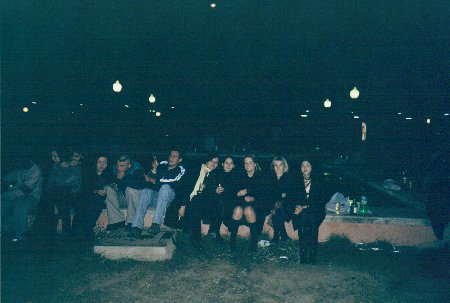
ENTERTAINMENT: WHAT CAN WE DO?
GOING OUT IN ALMERIA
The
most appropriate days to go out are Fridays and Saturdays, although many people
prefer going out on Thursdays because they finish their classes on that day.
Our
typical Saturday night starts when we all ring our friends to meet at some hours.
We normally meet at 23:00 or 23:30. Before meeting we have a strong dinner and
after having a shower, we dress up with our best clothes (the most fashionable
ones). Boys usually wear "Dockers" and girls short skirts even if it is
cold. We are ready to go out. *
At
the meeting time, we collect some money from the group and buy some whisky
bottles and some cokes and we go to "El Parque"*. This is the place
where we make "botellón". Making a "botellón" is drinking
alcohol with your friends in the middle of a public park. It is awesome because
as there are a lot of people you can make new friends and see those people you are
interested in …J

We
finish the "botellón" around 1 o'clock. Then, we go to the pub zone,
which is called "4 calles". There you can find different types of pubs:
Irish taverns, heavy pubs, latin pubs, funky pubs, after- hours…
The best Irish pub is "Bribones". It is decorated with old furniture and pictures about England and Ireland. There, you can drink excellent beers: Carlsberg, Voll Damm, German beers, San Miguel…. They play different music styles: black music, latin music, pop, etc.
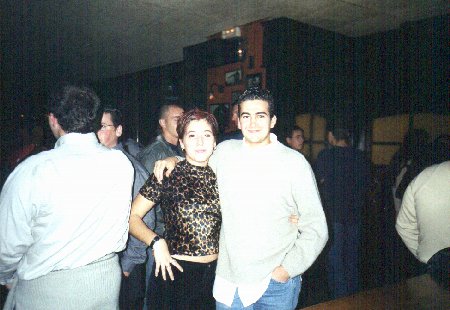
People who prefer listening to rock music can go to "Tormenta de Tormento", it's a peculiar place and its decoration is a bit surprising with lots of posters about rock groups. There you can hear: Smashing Pumkings, Eminem, Iron Maiden, Killer Barbies…
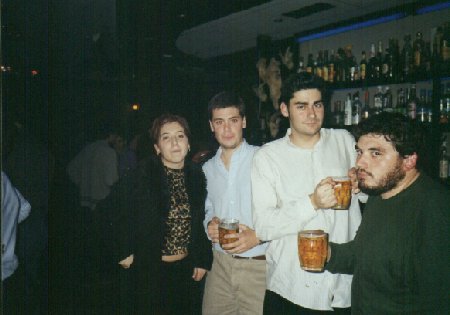
The best latin pubs are "Torero" and "Salsaya". You can dance salsa, merengue, samba… Ricky Martin and Enrique Iglesias hits are the most played.
"Blue" is the best funky- house pub, it is decorated all in blue and Modjo's "Lady" is its greatest hit.
All
these kinds of pubs close around 3 or 3:30. That's the time to go to the "After
Hours". The best ones are "La Clasica", "Molly Malone"
and "Sotanillo"*. They are open until dawn and you can find the
coolest people who like having a great time.
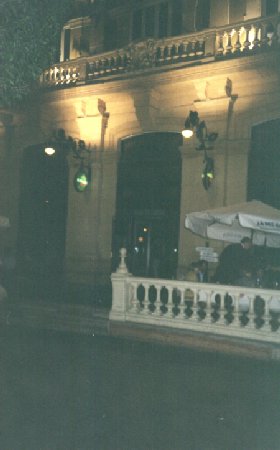
Each
drink costs around 600 pesetas ($2), but you can also drink "chupitos",
they are served as a cocktail but in tiny glasses. They are cheaper than having
a drink.
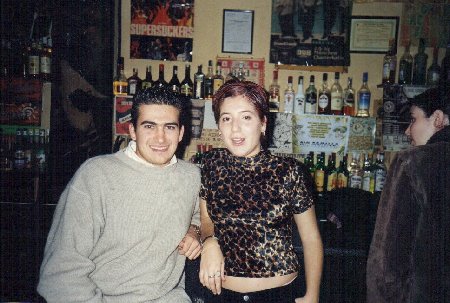
HAVING
COFFEE
All
these pubs also open in the afternoon, so that you can have some coffee. The
only difference is that they locate some tables to make a more relaxed
atmosphere.
But
the most fashionable place to have some coffee is Aguadulce. It is a touristic
village and the pubs are in the sea- side. There are a lot of terraces and
discos where you can have some coffee in the afternoon and go clubbing at night.
It is 16 kilometers away from Almeria.
SPORTS
Football
The
national sport in Spain is above all football (or “soccer” as American
people calls it). It is played everywhere in the country, and all kids play
since very young at schools. We also have two of the greatest teams of football
in the world, famous worldwide which are Real
Madrid and Fútbol Club Barcelona.
When these two teams play together, the country is almost completely paralysed,
you can see that while the match is played the streets in every city are empty.
Here in Spain as in every country in Europe, we have a different system of competition. First of all, our sport teams are not franchises, and because of this no team will change the city in which it plays. The teams represent the cities that host them, and are called after the city’s name: R. Madrid, F.C. Barcelona, Valencia C.F. ... But they also may be called with words such as “Atlético”, “Sporting”, “Racing”... (Atlético de Madrid, Sporting de Gijón, Racing de Santander...)
The
structure of the competition is quite different from the ones in American sports.
Our football championship is organised in groups called “divisiones” (divisions),
and are numbered: 1ª División, where the best 20 teams are, and where the
future champion of the tournament is; 2ª División A, with the next 20 best
teams, that will compete to gain their place in the 1ª División (each year,
the worse 3 teams in 1ª División go down to 2ª División, and the best 3 in 2ª
División A go up to 1ª División the following year)
Next
of 2ª División A we have four big groups in 2ª División B. These groups are
formed by 20 teams each and are more regional (Andalusian teams against the
teams from Extremadura or the Canary islands, for example). The best four teams
of each group at the end of the year will compete between them in four groups of
four teams to gain a place in 2ª A. Only the champion of each of these groups
will get to 2ª A, taking the place of the worse 4 ones in it after the season.
We can go deeper and deeper, on to 3ª División, Regional Preferente, 1ª
Regional... but these are of very small teams from villages or small towns.
Football
in Almería
Our
city has recently begun to grow, and because of that we have never had a strong
football team. Once we had a team in 1ª División for a season, I don’t
remember the year exactly, I think it was around 1980. It was called A.
D. Almería (Agrupación Deportiva Almería, I believe), but it could not
resist the economic rhythm of high competition and disappeared due to financial
problems.
There
are two teams in the city at present, which are, from older to younger, Polideportivo Almería and Almería
Club de Fútbol. The former is the substitute for the old A.
D. Almería, and has its uniform (t-shirt with vertical stripes red and
white, and blue shorts), and the latter (stripped white and red t-shirt and
white pants) was formerly an indoor football team called after his owner’s
surname, who also owns the most important shops on sporting clothes in the
province, Guillermo Blanes. Almería
C. F. has
even been for two years in 2ª A, but now is in 2ª B together with P. Almería.
Lately,
P. Almería has been carrying around financial problems as well, and there’s a
serious possibility of the two clubs uniting into one, which would be called Unión Deportiva Almería, but there is nothing concrete yet.
Basketball
Basketball
is the second sport followed by the Spanish people. It is practiced by a number
of people, but far less than football is. The difference is that football DOES
move people in a national scale while basketball doesn’t. We have a league,
named ACB (acronym for Association of Basketball Clubs). Important
clubs are Caja San Fernando (Seville),
Unicaja (Malaga), Joventut (Badalona), Tau
(Vitoria)... They are
named after their sponsors, if the sponsor changes, so does the name of the
team.
We
can mention a curious fact that you can’t see in American sport: R.
Madrid and F. C. Barcelona also
have a basketball team. They are sections
of these powerful football teams, and are also the strongest in the championship.
But more than this, in the case of F. C. Barcelona it also has a hockey team, a handball team, an
indoor football team...
Competition
is different from football. It is divided in similar categories, but here we
meet play-offs which don’t exist in the football league. In football you get 3
points for each wins, 1 for each draw, and no points for a loss, at the end the
team that has got a bigger amount of these points gets the trophy. But in
basketball we have play-offs as in America, and so have the rest competitions of
collective sports in Spain: handball, volleyball, indoor football, waterpolo,
hockey...
We
don’t have a representative team in the city of Almería but there is one in a
city nearby, El Ejido, which is competing in the equivalent in basketball for
football’s 2ª B.
Other
important sports
Tennis
is very followed in Spain, in fact Spanish players are among the best of the
world. Recently, Alex Corretja has played the Masters tournament in Portugal,
and our team will play the finals on the Davis’s Cup against Australia 33
years after our second final in the sixties. All of them against Australia. We
lost the first two, but as we say in Spanish: “a la tercera va la vencida”
We have to bare in mind that both previous finals were played in Australia in a
fast court of grass, but this time is in Barcelona, in a slower court just as
the ones in Roland Garros in Paris where our players are known as the best
specialists on this ground. Hope we win!!!
Sports
dealing with vehicles are very famous. Motorcycling and Rally world
championships as well as Formula 1have a lot of audience in TV. Alex Crivillé (motorcycling
world champion in 500cc in 1999), Carlos Checa and rally driver Carlos Sainz
world champion twice, are famous everywhere. There is a pilot from Almería
named David García competing in the category of 250cc in the world championship
of motorcycling.
Almería
is really important in one sport: volleyball. Almería hosts the current
champion in Spain, Unicaja Almería,
who was even 2nd in the European Champion’s League of volleyball a few years
ago, and a number of the players in the national team come from our city, and
some of them are playing in the Italian league considered as the NBA of
volleyball. We also have a women’s handball team in 1ª división, Vicar Goya,
from a town in the west of the province.
Because
of our geographical conditions Almería is very appropriate to practice sports
such as climbing, water skiing, windsurfing, rappel, and other alternative
sports.
Events
An
important event is going to take place in Almería in five years time: The XV
edition of the Mediterranean Games. The year 2005 would be a great date to come
to our city and enjoy summer, our splendid weather, our fantastic beaches, our
famous worldwide “tapas” and some international sport competitions involving
Mediterranean countries. A perfect opportunity to approach to Mediterranean
culture!
Each
year there is a cycling competition that lasts one day, a race called Clásica
de Almería. Some years ago the famous Miguel Indurain and most recently the
German winner of the Tour de France Jan Ullrich run this race among other famous
riders. In order to promote Almería2005 a cycling team has been created one
year ago, its name is Costa de Almería and it run the famous Vuelta a España
recently in September.
We
don’t pay much attention to sports as athletics, boxing, swimming... in terms
of competitions. It is true that there are some good sportsmen and sportswomen
on these, but people don’t follow them except for rare exceptions such as
Olympic games. In the case of athletics these athletes depend on the aid of the
government and are paid money according to the results they get. There has been
a lot controversy after Spanish sport’s poor performance in the last Olympics
in Sydney, and The ADO plan (the system of aids to sportsmen in Spain) has been
enormously criticized. But anyway, a week passed and people concentrated again
in the football league.
Links
(sports newspapers):